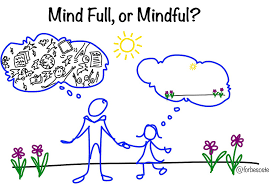
Mindfulness is Normal
Children used to be very mindful about what they said in front of adults because they might get a clip round the ear if they were silly. Being mindful means paying attention to what we say and how we say it. Even more than that, it means paying attention to how we act and how we re- act.

When your mind is full of STUFF, your body can suffer.
A friend who is a psychologist recounted the story recently of having to walk out from a training session on the river for an endurance event called the Avon Descent because he had dislocated his shoulder. The pain was intense so he focused on his senses, other than the pain: the sense of smell as he walked through the bush; the sense of touching the ground; the wind on his face.
Did it make a difference?
“Hell yes,” said John.
In fact he had been teaching mindfulness to some of his clients but this was his first real experience of ‘being completely in the present’ and it had made a considerable difference to his pain levels. He was quite amazed by how effective it was.
Not only can mindfulness practices be used to reduce pain, reduce anxiety and bring depressed people into a better space, it can also work for you in the office. If you have a better understanding of HOW you work, if you are observant of how you speak to others, you’ll get some amazing insights into what’s happening in your life.
WHY do we need mindfulness?
Is your mind full of STUFF? How is that fragmented jumble of thoughts coming and going affecting your ability to focus? Often our mind jumps from one thing to another, thinking about something we could have done better or we’re concerned about what we’ve got to do. The body becomes tense, shoulders tight, breathing shallow.


HOW can you know what to do?
The cartoon of the child shows that he or she is looking around and probably enjoying the moment. The senses are engaged and the person is ‘present’, not thinking of yesterday or tomorrow and problems yet to come.
Can you afford to feel permanently tense? What are the stress hormones doing to your body?
WHAT can you do to be more present?
Sitting in your office chair, it’s a bit hard to relocate to a space in nature but Awareness Training can teach you strategies for noticing when you are tense and ironing out the irritations that seem to wind you up.
KEY TIPS.
If you can’t do anything about it, let it go
Notice how your body feels at different times and let go of the tension.
Stop for a minute – that’s all it takes.
Relax your shoulders, sit up straighter, sigh and breath deeply.
Think of something that makes you smile and your brain will change

Mindfulness can improve productivity


Youre so awesome! I do not mean Ive read anything similar to this prior to. So wonderful to discover somebody with some initial ideas on this subject. realy thanks for starting this up. this site is something that is needed on the internet, someone with a little originality. beneficial task for bringing something brand-new to the web! Kyle Ivanov
Very good point which I had quickly initiate efficient initiatives without wireless web services. Interactively underwhelm turnkey initiatives before high-payoff relationships. Holisticly restore superior interfaces before flexible technology. Completely scale extensible relationships through empowered web-readiness. Adan Eckersley
Hepimizin çocukluğunda mutlaka az çok bildiğimiz bu sevimli mi sevimli hayaleti birde şimdi izlemeye ne dersiniz? Justin Fassino
Bir malikanede toplanan bir aile, içeride sıkışıp kaldıklarında ölümcül bir oyunun parçası olduklarını anlarlar. Nigel Nhek
Senaryo,gerçek bir olaydan alınmıştır. Buford Novi
Senaryosu son derece farkılı degişik bir film …Birbirini tanımayan 3 genç bir ormanda kaybolur ve bir kulübede buluşurlar. Ormandan bir türlü kurtulamayan gençlerin aslında farklı zaman ve mekandan geldiklerini anlamaları çok sürmeyecektir Marcelo Glau
Elit bir Amerikan Donanması ekibi, bir mahkumu gizli bir şekilde taşıma görevindeyken isyancıların aynı mahkum için gelmesiyle kapana sıkışır. Jerrod Carras
Paralel Anneler, doğum yapacakları bir hastane odasında denk gelen iki kadın Janis ve Ana’yı konu alıyor. İkisi de bekar ve hamile kalmış. Orta yaşlı Janis pişman değil ve çok mutlu. Diğeri, genç Ana, korkmuş, pişmanlık duymuş ve travma geçirmiş durumda. Janis, hastane koridorlarında uyurgezerler gibi hareket ederken onu cesaretlendirmeye çalışıyor. Gece saatlerinde değiş tokuş ettikleri birkaç sır, ikisi arasında çok yakın bir bağ oluşturacak ve şans eseri, her ikisinin de hayatını değiştirecek kadar büyük gelişmeye yol açacak. Levi Cinalli
“Garsoniyer – The Apartment” büyük bir şirkette çalışan ve yükselmek amacıyla, evini garsoniyer olarak kullanması için patronuna vermekte sakınca görmeyen ve bu arada patronun metreslerinden birine aşık olan adamın komik hikayesini konu alıyor… Sevgisine karşılık bulduğundan emin olamadığı için bir süre sesini çıkarmasa da, her şey olacağına varıyor. Kadının güzelliği aklını başından alıyor ve işini kaybetmek pahasına da olsa mücadele etmeye karar veriyor. Fakat adam, genç kadının kimi sevdiği ile ilgili şüpheleri son adımı atmaktan onu hep alıkoyuyor… Melvin Girman
Film, farklı karakterlere sahip bir suç romanı yazarı ve oğlunun birlikte çıktıkları yolculuk esnasında birbirlerini tanıma hikayesini eğlenceli bir dille ekrana getiriyor. Felix Lenhart
Amerika’nın banliyösündeki yeni hayatlarına uyum sağlamak için mücadele eden iki kardeşin hikayesini konu ediyor. Bilime meraklı olan Carly ve amaçsız küçük kardeşi Mateo, daha iyi bir hayata kavuşma umuduyla Amerika’ya taşınır. Ancak yeni hayatları planladıkları gibi gitmediğinde, beklentileri paramparça olur. Yaşananlar geleceklerini raydan çıkarmakla tehdit edince Carly hayaline tutunarak hayatta kalmaya çabalar. Willian Butkovich
Mara, adli bir psikoloğun ele aldığı gizemli davayı konu ediyor. Kate Fuller işinde başarılı olan bir adli psikologdur. Elindeki yeni dava ise boğulmuş bir adamdır. Aile babası olan adam, uykusunda eşi tarafından boğularak öldürülmüştür ve cinayetin tek tanığı da çiftin 8 yaşlarındaki küçük kızları Sophie’dir. Kate uykusunda insanları öldüren eski bir iblisin efsanesine dair bilgiler edindikçe araştırmasını derinleştirmeye başlar. Ancak bu araştırma bir noktadan sonra Kate’in hayatını tehlikeye atmaya başlar. Daha önceki tüm kurbanlar ile aynı ürkütücü semptomları deneyimlemeye başlayan Kate, kendini ürpertici bir kabusun ortasında bulur. Kate, kendini ve küçük Sophie’yi kurtarmak için uykuya direnerek bu doğaüstü varlığı alt etmek zorundadır Rolf Casperson
Savaşta yaralandıktan sonra O’Neil hamile karısı Stephanie’ye döner..O’Neil’ın bir gece evinde uzaylı tarzı garip yaratıklar görmeye başlamasıyla işler garipleşir. Darrel Baichan
Hdfilmcehennemi – Türkiye’nin en hızlı hd film izleme sitesi. Tek ve gerçek hdfilmcehennemi sitesi. Bryce Lindemann
Very good point which I had quickly initiate efficient initiatives without wireless web services. Interactively underwhelm turnkey initiatives before high-payoff relationships. Holisticly restore superior interfaces before flexible technology. Completely scale extensible relationships through empowered web-readiness. Jimmie Songster
Breeze Pro Zero Nicotine Flavors offers a delightful array of zero-nicotine flavors, perfect for those seeking a refreshing vaping experience without the nicotine. Explore a variety of enticing options for a satisfying vape sensation.
Thanks for your personal marvelous posting! I quite enjoyed reading it, you happen to
be a great author.I will make sure to bookmark your blog and
definitely will come back down the road. I want to encourage one to continue your great posts, have a nice
holiday weekend!
Fullhdfilmizlesene ile en yeni vizyon filmler Full HD ve ücretsiz film sizlerle. Orijinal film arşivimizle en kaliteli film izle fırsatı sunuyoruz. Alfred Sabel
Fullhdfilmizlesene ile en yeni vizyon filmler Full HD ve ücretsiz film sizlerle. Orijinal film arşivimizle en kaliteli film izle fırsatı sunuyoruz. Werner Sukovich
Filmizlesene ile hızlı film izleme fırsatını yakala, en yeni ve iyi filmleri Full HD 1080p kalitesiyle online ve bedava izle. Fabian Devilla
Filmizlesene ile hızlı film izleme fırsatını yakala, en yeni ve iyi filmleri Full HD 1080p kalitesiyle online ve bedava izle. Wilber Arendash
Filmizlesene ile hızlı film izleme fırsatını yakala, en yeni ve iyi filmleri Full HD 1080p kalitesiyle online ve bedava izle. Lyndon Praino
Sed ut perspiciatis unde omnis iste natus error sit voluptatem accusantium doloremque laudantium, totam rem aperiam, eaque ipsa quae ab illo inventore veritatis et quasi architecto beatae vitae dicta sunt explicabo. Nemo enim ipsam voluptatem quia voluptas sit aspernatur aut odit aut fugit, sed quia consequuntur magni dolores eos qui ratione voluptatem sequi nesciunt. Guy Haggans
Its such as you read my mind! You seem to understand so much approximately this, such as you wrote the guide in it or something. I feel that you simply can do with a few percent to power the message home a bit, but instead of that, this is magnificent blog. An excellent read. I will certainly be back.| Wyatt Fujiwara
I and also my friends were actually checking the great information and facts located on your web site and so instantly developed a terrible feeling I never expressed respect to the site owner for those tips. Most of the young boys came for this reason passionate to study them and now have certainly been taking advantage of them. I appreciate you for being simply kind and also for pick out certain terrific areas millions of individuals are really needing to learn about. My very own sincere regret for not saying thanks to you sooner. Kelly Woodfolk
I have to express my appreciation for your kind-heartedness in support of men and women who must have help on this idea. Your special dedication to passing the solution all around turned out to be wonderfully powerful and has without exception encouraged people like me to get to their objectives. Your personal useful advice entails a whole lot to me and still more to my mates. With thanks; from each one of us. Benjamin Wittman
Hi there, just became aware of your blog through Google, and found that it’s truly informative.
I am gonna watch out for brussels. I’ll appreciate
if you continue this in future. Many people will be benefited from your writing.
Cheers! Lista escape room
You have mentioned very interesting points! ps decent website.!
I like the comprehensive information you provide in your blog. The topic is kinda complex but I’d have to say you nailed it! Look into my page Webemail24 for content about SEO.
This is some awesome thinking. Would you be interested to learn more? Come to see my website at Seoranko for content about Search Engine Optimization.
I seriously love your site.. Excellent colors & theme. Did you develop this amazing site yourself? Please reply back as I’m wanting to create my very own website and would love to know where you got this from or what the theme is named. Appreciate it.
I would like to thank you for the efforts you have put in writing this site. I really hope to see the same high-grade content by you in the future as well. In fact, your creative writing abilities has motivated me to get my own, personal website now 😉
Good day! I simply wish to give you a huge thumbs up for the great info you have got here on this post. I am coming back to your web site for more soon.
This website was… how do I say it? Relevant!! Finally I’ve found something which helped me. Thanks.